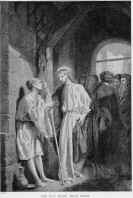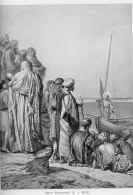Discipleship: Disciples Who Didn’t Understand
Christianity has never been doctrinally perfect. Even the apostolic churches were not perfect. In fact, much of the New Testament was written to correct various wrong ideas. In Corinth, for example, Christians were tolerating incest, suing one another in court, eating in pagan temples and misbehaving at the Lord’s Supper. Some thought they should be celibate, and some thought they should divorce their non-Christian spouses. Paul had to correct all these ideas, and history tells us that he had only limited success. But the people were Christian despite their mistakes and carnal mindedness.
Paul told us what was most important: the death, burial and resurrection of Jesus Christ (1 Corinthians 15:1-4) and the importance of love (1 Corinthians 12:31-13:8). Our knowledge, he says, is only partial (verse 9). It will be completed after Christ returns, but for now, love is more important than knowledge (verses 13, 2). In saying this, I don’t mean to imply that doctrinal correctness is not important. We strive for correctness, but admit that we are not infallible.
It encourages me to know that Jesus’ own disciples, both before and after Pentecost, frequently didn’t understand what the Master was doing. Although they had a perfect Teacher, they often failed to understand him correctly. Nevertheless, Jesus used them. This demonstrated that the disciples’ success was a result of God’s work, not human achievement.
 For example, after Jesus miraculously fed thousands of people, he and the disciples got into a boat, and Jesus warned them, “Watch out for the yeast of the Pharisees and that of Herod” (Mark 8:14). The disciples concluded that Jesus meant that, since they hadn’t brought any bread and would have to buy some on the other shore, they shouldn’t buy any bread from a Pharisee or Herodian because something was incorrect about the yeast they used.
For example, after Jesus miraculously fed thousands of people, he and the disciples got into a boat, and Jesus warned them, “Watch out for the yeast of the Pharisees and that of Herod” (Mark 8:14). The disciples concluded that Jesus meant that, since they hadn’t brought any bread and would have to buy some on the other shore, they shouldn’t buy any bread from a Pharisee or Herodian because something was incorrect about the yeast they used.
Why didn’t they simply ask Jesus what he meant? The Bible doesn’t tell us why, but it was probably because they were afraid of looking foolish. (That happens today, too.) But Jesus knew quite well how foolish they were. He chided them for not understanding something that they should have been able to understand. They could remember facts (verses 19-20), but they didn’t draw right conclusions. Jesus could make bread miraculously. The disciples didn’t need to worry about bread or yeast.
 Actually, Mark doesn’t inform his readers what Jesus really did mean. He simply ends the story with “Do you still not understand?” (verse 21). Thankfully, Matthew helps us out by telling us what Jesus was talking about. The miracle of the loaves was not just a way to save money — it also had a meaning that the disciples should have understood (Mark 6:52). It was figurative, symbolizing the fact that Jesus is our source of life. His teachings are what we need to live forever. When he warned his disciples about the yeast of the Pharisees, he was talking about their doctrines (Matthew 16:12). The disciples were to live on the teachings of Jesus, not the teachings of the Pharisees.
Actually, Mark doesn’t inform his readers what Jesus really did mean. He simply ends the story with “Do you still not understand?” (verse 21). Thankfully, Matthew helps us out by telling us what Jesus was talking about. The miracle of the loaves was not just a way to save money — it also had a meaning that the disciples should have understood (Mark 6:52). It was figurative, symbolizing the fact that Jesus is our source of life. His teachings are what we need to live forever. When he warned his disciples about the yeast of the Pharisees, he was talking about their doctrines (Matthew 16:12). The disciples were to live on the teachings of Jesus, not the teachings of the Pharisees.
We learn a similar lesson in the Gospel of John. Soon after a miracle of physical bread, Jesus proclaimed himself the bread of life (John 6:32-35). He then said that people must eat his flesh and drink his blood if they want to have eternal life (verse 54). This was much too strange for many people. His disciples called it “a hard teaching,” and they grumbled about it (verses 60-61). They did not understand it, and many left him (verse 66). But the Twelve remained because Jesus had the teachings of eternal life (verse 68).
They didn’t understand, but that wasn’t a reason to leave. They set a good example of faith and patience for us today. The disciples eventually learned what Jesus was talking about. The people who left him, however, remained in ignorance. Although the human desire is to understand everything right away, we need patience when dealing with the teachings of Jesus Christ.
 Now let’s look at an incident in the Gospel of Luke. The 12-year-old Jesus was in the temple, amazing everyone with his understanding (Luke 2:47). But his parents were astonished that he had done such a thing. They did not understand (verses 48-50). His mother treasured these things in her heart (verse 51), but she didn’t understand her Son until many years later, probably after his resurrection more than 20 years later.
Now let’s look at an incident in the Gospel of Luke. The 12-year-old Jesus was in the temple, amazing everyone with his understanding (Luke 2:47). But his parents were astonished that he had done such a thing. They did not understand (verses 48-50). His mother treasured these things in her heart (verse 51), but she didn’t understand her Son until many years later, probably after his resurrection more than 20 years later.
We need to ask God for patience like that — if there are things we don’t understand, questions that haven’t been resolved to our satisfaction, then we can treasure them in our hearts for a while. In time, Christ will reveal to us whatever we need to know — if our hearts are right, if we are trusting in him.
Early in Jesus’ ministry, the disciples were amazed when Jesus calmed a storm, and they asked one another, “What kind of man is this?” (Matthew 8:27). It was a very good question, and Matthew gives us the answer only two verses later: He is the Son of God. A few chapters later, there was another storm at sea, and after Jesus walked on the water and calmed the storm, the disciples correctly concluded, “Truly you are the Son of God” (Matthew 14:24-33). But they still had much to learn (Mark 6:51-52).
A short while later, Jesus offended the Pharisees by criticizing their obsession with ritual cleanness (Matthew 15:2, 11). When the disciples asked Jesus to explain what he meant, he asked, “Are you still so dull?” (verses 15-16). This doesn’t seem like a very nice response, but Jesus said it, and one of the disciples wrote this down because it can help us. I find it encouraging to learn that Jesus doesn’t require us to be extra-brilliant scholars. When it takes me years to learn things from the Bible, I take comfort in the fact that it also took years for the disciples to learn things even when Jesus was with them in the flesh.
One of the most dramatic stories of misunderstanding begins with Jesus asking his disciples, “Who do people say I am?” (Mark 8:27). And Peter said, “You are the Christ” (verse 29). Peter understood this much correctly — not because he was extra clever, but because God had revealed it to him. Even so, he understood only part of what he needed to.
Peter had the right word — Messiah or Christ — but he had a woefully incorrect idea of what a Messiah would do. Peter wanted a conquering hero, but Jesus talked about suffering and death (verse 31). Peter, with zeal greater than wisdom, began to rebuke his own Teacher, as if he could teach the Messiah a thing or two. Jesus rebuked him sharply because he was thinking like a human (verse 33).
All of us, being human, naturally think the things of humans. And because of that, we do not always understand the things of God. That should not surprise us or alarm us. When it happens, we need to patiently wait for God to reveal more to us. Of course, we need to do our part, searching the Scriptures and asking God for understanding. We should also take advantage of the tools that God provides, including reading and listening to Christian teachers.
We are all disciples or learners. As followers of Jesus, we have to continue learning. The Holy Spirit leads us into all truth, but this doesn’t happen instantly. Quite the contrary: We will die before we know it all. That’s why it is reassuring to know that God looks on the heart. Salvation is not some sort of intelligence contest. God’s power is made perfect in weakness.
Peter wasn’t ready to accept a suffering Messiah, but he wasn’t ready to accept a glorious Messiah, either. Mark 9 tells us that when Peter saw Jesus in glory, he was so frightened that he didn’t know what to say (verse 6). Jesus told his disciples to keep the Transfiguration secret until he had risen from the dead — and right away the disciples began discussing what “rising from the dead” meant (verses 9-10). It seems quite plain to us today, but it was a mystery to these men. They could have asked Jesus what he meant, but they did not. Instead, they discussed it among themselves, sharing their ignorance instead of learning from the Master. Sometimes modern disciples do that, too.
In verse 31, Jesus again predicted his own death and resurrection, and the disciples still didn’t understand. Not only that, they were afraid to ask him! Jesus was the perfect embodiment of love and truth, but his disciples were afraid to ask him what he meant (verse 32). Perhaps they were afraid of the truth. That continues to happen to people today.
Jesus not only predicted his own death, he also said that his followers must take up their crosses and forsake all (Mark 8:34). Nevertheless, it was not long before his followers, probably thinking of a physical kingdom again, argued among themselves as to who would be the greatest. Jesus knew their thoughts and asked them about it, but they were too ashamed to answer (Mark 9:33-34). They had been acting like unconverted men.
A little later, the disciples were again amazed at what Jesus said (Mark 10:24). Jesus explained what he meant, and the disciples were even more amazed (verse 26). And soon they were astonished, and some were afraid (verse 32). How long had they been with their Teacher, and yet continued to be surprised by what he taught! They understood only a fraction of what he said, and yet they continued to follow him, because he had the words of eternal life. Their faith was not perfect, but it was enough to keep them going.
Jesus predicted that a disciple would betray him, but the disciples did not understand this seemingly plain statement. They just stared at one another (John 13:21-22). He predicted his death, and they did not understand (verses 36-37). They were filled with grief, but did not ask him what he meant (John 16:5-6). They asked each other, but none of them knew what he was talking about (verses 17-18).
 They expressed their faith, but Jesus predicted that they would forsake him (verses 30-32). Peter boldly proclaimed his allegiance, and the other disciples, equally ignorant, said the same (Mark 14:31). But when left to their own strength, they fell asleep, and they did not know what to say (verse 40). They all deserted him (verse 50). Even when eyewitnesses told them that Jesus had been resurrected, still they did not believe (Mark 16:13; John 20:9).
They expressed their faith, but Jesus predicted that they would forsake him (verses 30-32). Peter boldly proclaimed his allegiance, and the other disciples, equally ignorant, said the same (Mark 14:31). But when left to their own strength, they fell asleep, and they did not know what to say (verse 40). They all deserted him (verse 50). Even when eyewitnesses told them that Jesus had been resurrected, still they did not believe (Mark 16:13; John 20:9).
The disciples didn’t understand. They argued. They did things they shouldn’t have. They didn’t ask questions they should have. They were ordinary people. God uses people like that. He can use people like us, too, if our hearts and attitudes are right.
Even after Jesus’ resurrection, he chided his disciples for being foolish and slow of heart to believe (Luke 24:25). “Why are you troubled, and why do doubts arise in your minds?” (verse 38). They were full of joy and amazement, but still did not believe (verse 41). They even worshiped him, but some still doubted (Matthew 28:17).
The Gospel of John gives a summary of many such situations: “At first his disciples did not understand all this. Only after Jesus was glorified did they realize that these things had been written about him and that they had done these things to him” (John 12:16).
The pillars of the church had some shaky beginnings. Things improved after Pentecost, of course, but still they weren’t perfect. There were administrative problems in the Jerusalem church. There were differences of opinion about gentiles and laws. There were controversies about the missionary work of Paul. There were problems in his churches and tension among the Christians in Rome.
God’s church has never had complete doctrinal perfection. Throughout history, Christians have wrestled with different doctrines and practices. Doctrinal errors are nothing new. That’s why it’s important that we always remain willing to re-examine the issues, admit our fallibility and be willing to change and grow in the grace and knowledge of our Savior. It may be difficult at times to change our ways, but that’s what we have been called to do. We are disciples, and thankfully, we are learning.
Author: Michael Morrison

